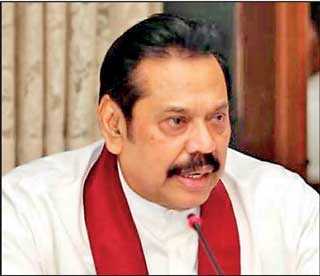Monday Feb 16, 2026
Monday Feb 16, 2026
Wednesday, 12 June 2019 00:00 - - {{hitsCtrl.values.hits}}
Opposition leader Mahinda Rajapaksa yesterday said terrorism would never be allowed to exist under a Government led by him, calling for terrorism to be destroyed “by whatever means necessary”, but supported the protection of moderate Muslims.
 |
Opposition leader
|
Releasing a statement, Rajapaksa found fault with the United National Party (UNP) for failing to restore public confidence, promote national security, and effectively foster communal harmony after the Easter Sunday attacks.
“I wish to emphatically state before the people of Sri Lanka that terrorism will not be allowed to exist in this country under a Government led by me.”
He also contended that the emergence of Muslim-only political parties resulted in Muslim politicians having to rely on both moderates and those holding extremist views within the Muslim community for votes. This led to them gradually moving away from mainstream politics and embracing identity politics, which now has to be reversed to build stronger inter-community ties.
“Due to the emergence of exclusively Muslim political parties from the 1980s onwards, Muslims isolated themselves in the political sphere as well. The en masse resignation of Muslim Ministers marks a high point in this process. My friend M. H. M. Ashraff, who was the first to form an exclusively Muslim political party, later realised his mistake, and towards the end he formed a political party that was open to all communities, called the National Unity Alliance. But after his death, this trend towards integration stopped, and the isolationist trend gained momentum,” he said.
“Due to the fact that Muslim political leaders are completely dependent on the Muslim vote, they need the votes of the extremists within their community as well. Muslim extremism spread throughout this country because the Muslim leaders were unable to oppose it. There is the oft-heard charge that the Muslim leaders speak of reconciliation in Sinhala, but spread the message of communalism in Tamil. Islamic extremism has gained traction in this country due to that kind of politics.”
The resignation of all Muslim leaders from the Government was seen as a ploy to distract from the challenges of national security and No-Confidence Motions faced by the administration by Opposition leader Mahinda Rajapaksa. He argued that No-Confidence Motions have been a parliamentary practice for decades, with other Muslim politicians also facing motions in the past. However, the en masse resignation of Muslim leaders meant that the allegations against a specific politician went unanswered, and worsened community relations, he said.
“This time, however, when a No-Confidence Motion was tabled against one Muslim Minister, all Muslim Ministers in the Government resigned. This seems to be a ploy on the part of the UNP Government to organise and line up all Muslim politicians on one side, and to obtain the Muslim vote at the forthcoming Presidential Elections.”
But this political alignment would not assist the majority of the Muslim community, Rajapaksa argued. Instead, it was important to protect moderate Muslims, and work to root out the genuine extremists and terrorists, without victimising the entire community.
“The people of this country will never tolerate terrorism. This extremist terrorism will have to be destroyed by whatever means necessary. Due to the JVP’s terrorism, Sinhala persons were arrested, Sinhala homes and temples were searched. Due to LTTE terrorism, Tamil persons were arrested, Tamil homes and kovils were searched. If a terrorism that has emerged from within the Muslim community is to be crushed, Muslim individuals will have to be arrested, Muslim homes and mosques will have to be searched. Anyone who says that terrorism can be crushed without such measures, is not being truthful.”
“Terrorism based on religion may be a new thing to us, but it’s a very familiar menace in all Muslim-majority countries. As in the case of Sri Lanka, religious extremism is the biggest enemy of the worldwide Muslim community. The extremist terrorism that has now come into this country will not do the local Muslim community any good. I hope the danger of isolating local Muslims from other communities in this country would have dawned on our Muslim leaders, at least at this late stage,” he said.
Rajapaksa called on non-Muslim communities to work to protect moderate Muslims, and advocated for change from within the Muslim community.
“All other communities must get together and protect the moderate Muslims at this juncture. Every Muslim, for his part, should use his own reason and eschew narrow religion-based politics. That change should come from within the Muslim community. When the people of different communities in this country are uniting against terrorism, we expect the moderate Sri Lankan Muslim community to join them, following the example set by the vast majority of the global Muslim community.”